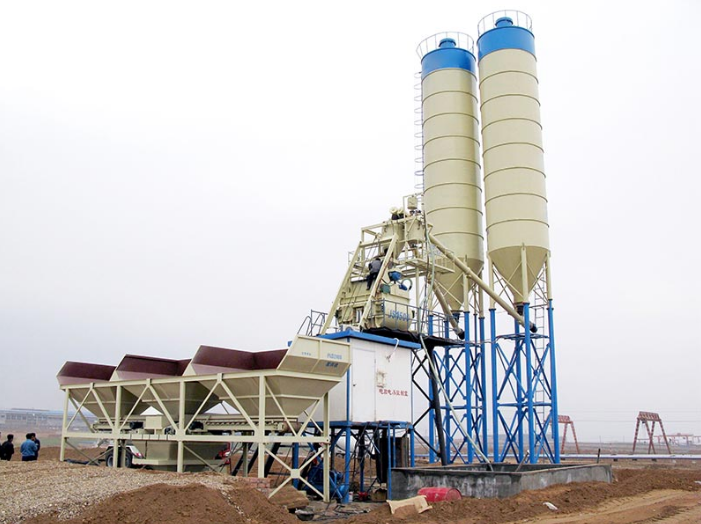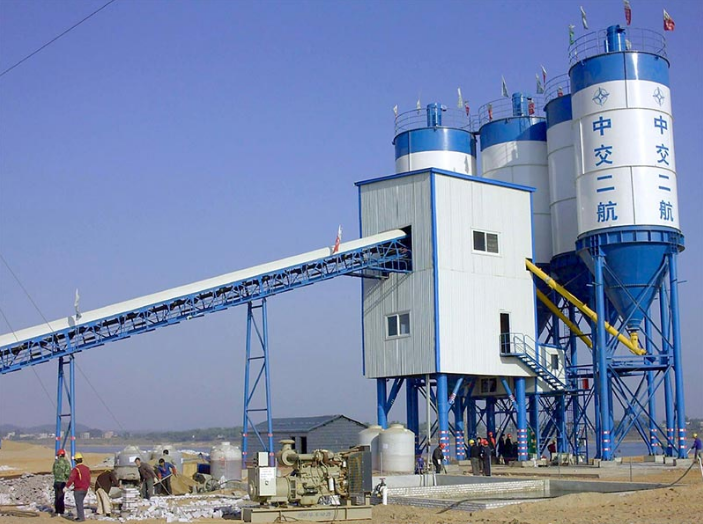What are the Advantages of Stationary Concrete Plant?
Concrete Batching Plants are modern production facilities that produce concrete used in almost all construction projects with precise weighing and homogeneous mixing technology.
Concrete in concrete plants is produced through the following process: High-quality concrete is created by meticulously combining aggregates, cement, water, and additives in precise accordance with predetermined production recipes. This mixture is then efficiently and rapidly mixed using high-performance concrete mixers located within concrete plants.
When the concrete plants were first designed years ago, they were designed as stationary type. But over time and in parallel with the developing technology, stationary concrete plants have also developed greatly.
A stationary concrete plant generally comprises the following units:
1. Aggregate Bunker (unit for storing aggregates)
2. Aggregate Weighing Conveyor (unit for precise weighing of aggregates under the aggregate bunker)
3. Aggregate Transfer Conveyor or Aggregate Transfer Bucket (unit that carries the weighed aggregate to the mixer)
4. Cement Silo (unit for storing cement)
5. Cement Screw (unit that conveys cement from the cement silo to the cement scale)
6. Cement-Water-Additive Scales (units for precise weighing of cement, water, and additives)
7. Mixer (a mixer in which the weighed materials are mixed homogeneously and quickly)
8. Main Chassis (the unit containing the mixer, cement-water-additive scales, with carrier legs under which a transmixer will enter)
9. Control Cabinet and Computerized Fully Automatic Control System (concrete is produced automatically according to the concrete recipes entered into the system)
10. Air Compressor and Pneumatic Equipment (equipment producing compressed air required for the operation of the facility)
These components work in concert to ensure the efficient and automated production of concrete based on predefined recipes.
What are the Advantages of Stationary Concrete Plant?
Modern stationary concrete batching plants are meticulously designed to offer several advantages, focusing on maximum capacity, high flexibility, efficiency, and reliability. These plants are engineered to produce various types of high-quality concrete consistently and in large quantities.
The Advantages of Stationary Concrete Plant are:
1. High Production Capacity and Performance: Capable of producing a wide range of concrete, with production capacities ranging from 30 m³/h up to 200 m³/h (up to 400 m³/h with double mixer), ensuring high performance.
2. High Configuration Flexibility: Offers flexible structures and configuration options that can fully meet user needs.
3. Special Settlement Opportunities: Provides settlement alternatives that can accommodate various installation areas.
4. Durable and Long-Life Main Chassis and Aggregate Bunker Design: Features a robust construction, ensuring safe transportation, long working life, and minimized vibrations for precise weighing.
5. Easy and Fast Maintenance: Equipped with wide maintenance platforms for easy and safe access to main parts, mixer weighing scales, and a special solid upper platform.
6. Specialized Concrete Production Facility: Suitable for the production of various concrete types such as RCC, concrete parquet, concrete pipe, and prefabricated elements.
7. Versatility in Concrete Production: Supports age type, dry type, wet type, and hybrid (wet & dry) concrete production facilities.
Applications of Stationary Concrete Plants:
Ready-mixed concrete producers, who produce concrete in-house and supply it to other construction companies and concrete users, often opt for stationary concrete plants due to their advantages in mass production, high performance, and flexibility.
Stationary concrete plants are particularly preferred in construction projects that demand high-quality concrete production, including roads, dams, airports, and projects requiring premium concrete. Moreover, Stationary Concrete Batching Plants find application in specialized concrete production tasks such as RCC (Roller Compacted Concrete), concrete parquet, concrete pipe manufacturing, prefabricated element production (prefabricated columns and beams), and the production of hollow concrete floors.





Comments